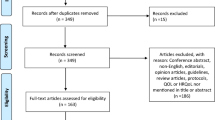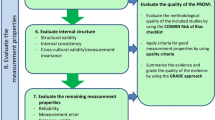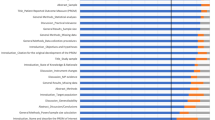Abstract
Purpose
Although health-related quality of life (HRQL) is increasingly assessed in randomized controlled trials (RCTs), HRQL findings are not always incorporated into clinical decision making. We examined the current perspectives of oncologists on the use of HRQL findings from RCTs, and variation of these perspectives between countries and specialties.
Methods
A cross-sectional e-survey of oncologist members of the NCIC Clinical Trials Group, the United Kingdom National Cancer Research Institute Clinical Studies Groups, and the Australia/New Zealand cancer clinical trials network was conducted. Respondents reported their perceptions of the usefulness of RCT HRQL outcomes for informing practice, their use of HRQL findings in practice, barriers/facilitators to this use, and preferences for HRQL data presentation in RCT publications. Chi-square tests compared responses between countries and specialties.
Results
A total of 396 oncologists participated (estimated response rate: 30 %). The most frequently reported specialties were medical (46 %) and radiation (37 %) oncology. HRQL findings from RCTs were reported as useful (73 %), but were infrequently used to guide clinical decisions with patients. Perceived barriers were lack of time (67 %) and understanding (57 %), and concerns about generalizability of results (68 %). Identified facilitators included joint publication of HRQL/clinical outcomes (96 %) and summary of clinical implications of HRQL findings in RCT publications (76 %). Use of HRQL findings, perceived barriers/facilitators, and presentation preferences did not differ by country or specialty.
Conclusions
Oncologists support HRQL findings from RCTs, but perceive important barriers to their use in clinical decision making, regardless of country or specialty. Combined, clear reporting of HRQL/clinical data may facilitate their clinical application.




Similar content being viewed by others
References
Osoba, D. (2011). Health-Related Quality of Life and cancer clinical trials. Therapeutic Advances in Medical Oncology, 3, 57–71.
Bezjak, A., Ng, P., Skeel, R., et al. (2001). Oncologists’ use of quality of life information: Results of a survey of eastern cooperative oncology group physicians. Quality of Life Research, 10, 1–13.
Guyatt, G. H., Ferrans, C. E., Halyard, M. Y., et al. (2007). Exploration of the value of health-related quality-of-life information from clinical research and into clinical practice. Mayo Clinic Proceedings, 82, 1229–1239.
Greenhalgh, J. (2009). The applications of PROs in clinical practice: What are they, do they work, and why? Quality of Life Research, 18, 115–123.
Basch, E. (2010). The missing voice of patients in drug-safety reporting. New England Journal of Medicine, 362, 865–869.
Au, H.-J., Ringash, J., Brundage, M., et al. (2010). Added value of Health-Related Quality of Life measurement in cancer clinical trials: The experience of the NCIC CTG. Expert Review of Pharmacoeconomics & Outcomes Research, 10, 119–128.
Brundage, M., & Snyder, C. (2012). Patient-reported outcomes in clinical practice: Using standards to break down barriers. Clinical Investigation, 2, 343–346.
Brundage, M., Bass, B., Jolie, R., et al. (2011). A knowledge translation challenge: Clinical use of quality of life data from cancer clinical trials. Quality of Life Research, 20, 979–985.
Brundage, M., Bass, B., Davidson, J., et al. (2011). Patterns of reporting Health-Related Quality of Life outcomes in randomized clinical trials: Implications for clinicians and quality of life researchers. Quality of Life Research, 20, 653–664.
Meldahl, M. L., Acaster, S., & Hayes, R. P. (2013). Exploration of oncologists’ attitudes toward and perceived value of patient-reported outcomes. Quality of Life Research, 22, 725–731.
Calvert, M., Blazeby, J., Revicki, D., et al. (2011). Reporting quality of life in clinical trials: A CONSORT extension. Lancet, 378, 1684–1685.
Sackett, D. (1991). How to get the most from and give the most to continuing medical education. In B. Haynes, D. Sackett, G. Guyatt & P. Tugwell (Eds.), Clinical epidemiology: A basic science for clinical medicine, 2nd ed. Boston/Toronto: Little, Brown and Co.
Logan, J., & Graham, I. D. (1998). Toward a comprehensive interdisciplinary model of health care research use. Science Communication, 20, 227–246.
Dillman, D. A. (2000). Mail and internet surveys- the tailored design method. New York, NY: Wiley.
SurveyMonkey Inc: www.surveymonkey.com.
Gough, I., & Dalgleish, L. (1991). What value is given to quality of life by health professionals considering response to palliative chemotherapy for advanced cancer? Cancer, 68, 220–225.
Bezjak, A., Taylor, K. M., Ng, P., et al. (1998). Quality-of-life information and clinical practice: the oncologist’s perspective. Cancer Prevention & Control, 2, 230–235.
Walsh, D. L., & Emrich, L. J. (1998). Measuring cancer patients’ quality of life: A look at physician attitudes. New York State Journal of Medicine, 88, 354–357.
Taylor, K. M., Feldstein, M. L., Skeel, R., et al. (1994). Fundamental dilemmas of the randomized clinical trial process: Results of a survey of the 1,737 eastern cooperative oncology group investigators. Journal of Clinical Oncology, 12, 1796–1805.
Morris, J., Perez, D., & McNoe, B. (1998). The use of quality of life data in clinical practice. Quality of Life Research, 7, 85–91.
Ringash, J., & Bezjak, A. (2006). Use of quality-of-life assessment for nasopharyngeal cancer. Clinical Oncology (R Coll Radiol), 18, 725–727.
Goodwin, P. J., Black, J. T., Bordeleau, L. J., et al. (2003). Health-related quality-of-life measurement in randomized clinical trials in breast cancer—taking stock. Journal of the National Cancer Institute, 95, 263–281.
Efficace, F., Feuerstein, M., Fayers, P., et al. (2014). Patient-reported outcomes in randomised controlled trials of prostate cancer: Methodological quality and impact on clinical decision making. European Urology, 66, 416–427.
Guyatt, G., & Schunemann, H. (2007). How can quality of life researchers make their work more useful to health workers and their patients? Quality of Life Research, 16, 1097–1105.
McNair, A. G., Brookes, S. T., Davis, C. R., et al. (2010). Communicating the results of randomized clinical trials: Do patients understand multidimensional patient-reported outcomes? Journal of Clinical Oncology, 28, 738–743.
Calvert, M., Blazeby, J., Altman, D. G., et al. (2013). Reporting of patient-reported outcomes in randomized trials: The CONSORT PRO extension. JAMA, 309, 814–822.
International Society for Quality of Life Research. Best Practices for PROs in Randomized Clinical Trials: http://www.isoqol.org/about-isoqol/committees/best-practices-for-pros-in-randomized-clinical-trials.
Brundage, M., Blazeby, J., Revicki, D., et al. (2013). Patient-reported outcomes in randomized clinical trials: Development of ISOQOL reporting standards. Quality of Life Research, 22, 1161–1175.
Kyte, D., Duffy, H., Fletcher, B., et al. (2014). Systematic evaluation of the patient-reported outcome (PRO) content of clinical trial protocols. PLoS One, 9(10), e110229. doi:10.1371/journal.pone.0110229.
Calvert, M., Brundage, M., Jacobsen, P. B., et al. (2013). The CONSORT patient-reported outcome (PRO) extension: Implications for clinical trials and practice. Health and Quality of Life Outcomes, 11, 184.
Calvert, M., Kyte, D., Duffy, H., et al. (2013). Patient-reported outcome (PRO) assessment in clinical trials: A systematic review of guidance for trial protocol writers. PLoS One, 9(10), e110216. doi:10.1371/journal.pone.0110216.
Acknowledgments
Supported by the Ontario Graduate Scholarship; the Queen’s Transdisciplinary Training Program in Cancer Research in partnership with the Canadian Institutes for Health Research; Grant No. 394921 from the Canadian Institutes for Health Research; the Medical Research Council Hubs for Trials Methodology Research; the National Institute for Health Research Cancer Research Network; the Division of Cancer Care and Epidemiology; Cancer Care Ontario; and the Canadian Cancer Society. The research team is thankful to Ms. Brenda Bass for her input on survey development and to Drs. William Pickett and Colleen Davison for reviewing the survey. The research team acknowledges the contribution of the participating oncologists and clinical trials groups.
Conflict of interest
None.
Ethical standards
We confirm that any aspect of the work covered in this manuscript that has involved human participants has been conducted with the ethical approval of all relevant bodies and that such approvals are acknowledged within the manuscript. As stated in the manuscript, all participants gave their informed consent prior to their inclusion in the study.
Author information
Authors and Affiliations
Corresponding author
Electronic supplementary material
Below is the link to the electronic supplementary material.
Rights and permissions
About this article
Cite this article
Rouette, J., Blazeby, J., King, M. et al. Integrating health-related quality of life findings from randomized clinical trials into practice: an international study of oncologists’ perspectives. Qual Life Res 24, 1317–1325 (2015). https://doi.org/10.1007/s11136-014-0871-9
Accepted:
Published:
Issue Date:
DOI: https://doi.org/10.1007/s11136-014-0871-9




